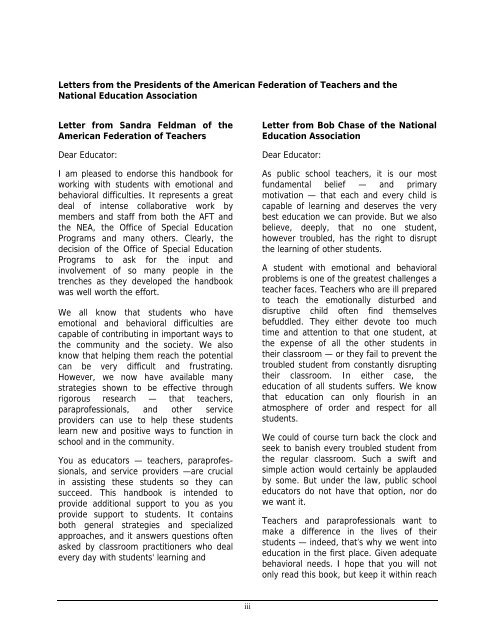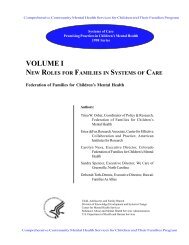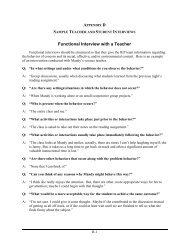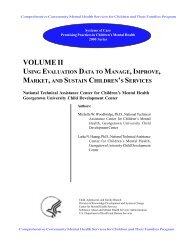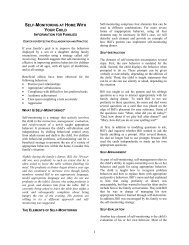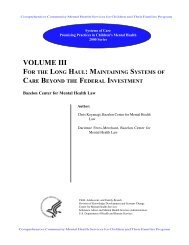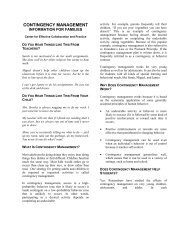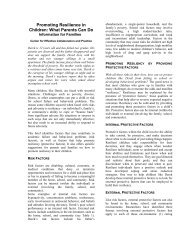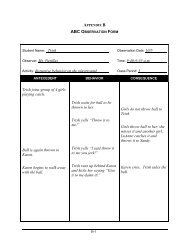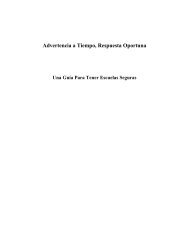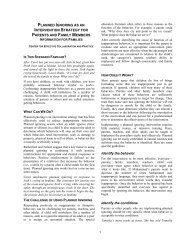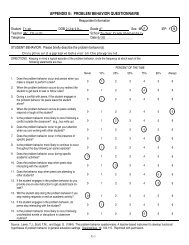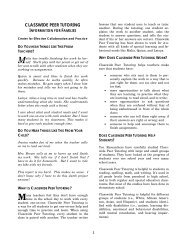educational strategies for children with emotional and behavioral ...
educational strategies for children with emotional and behavioral ...
educational strategies for children with emotional and behavioral ...
You also want an ePaper? Increase the reach of your titles
YUMPU automatically turns print PDFs into web optimized ePapers that Google loves.
Letters from the Presidents of the American Federation of Teachers <strong>and</strong> the<br />
National Education Association<br />
Letter from S<strong>and</strong>ra Feldman of the<br />
American Federation of Teachers<br />
Dear Educator:<br />
I am pleased to endorse this h<strong>and</strong>book <strong>for</strong><br />
working <strong>with</strong> students <strong>with</strong> <strong>emotional</strong> <strong>and</strong><br />
<strong>behavioral</strong> difficulties. It represents a great<br />
deal of intense collaborative work by<br />
members <strong>and</strong> staff from both the AFT <strong>and</strong><br />
the NEA, the Office of Special Education<br />
Programs <strong>and</strong> many others. Clearly, the<br />
decision of the Office of Special Education<br />
Programs to ask <strong>for</strong> the input <strong>and</strong><br />
involvement of so many people in the<br />
trenches as they developed the h<strong>and</strong>book<br />
was well worth the ef<strong>for</strong>t.<br />
We all know that students who have<br />
<strong>emotional</strong> <strong>and</strong> <strong>behavioral</strong> difficulties are<br />
capable of contributing in important ways to<br />
the community <strong>and</strong> the society. We also<br />
know that helping them reach the potential<br />
can be very difficult <strong>and</strong> frustrating.<br />
However, we now have available many<br />
<strong>strategies</strong> shown to be effective through<br />
rigorous research — that teachers,<br />
paraprofessionals, <strong>and</strong> other service<br />
providers can use to help these students<br />
learn new <strong>and</strong> positive ways to function in<br />
school <strong>and</strong> in the community.<br />
You as educators — teachers, paraprofessionals,<br />
<strong>and</strong> service providers —are crucial<br />
in assisting these students so they can<br />
succeed. This h<strong>and</strong>book is intended to<br />
provide additional support to you as you<br />
provide support to students. It contains<br />
both general <strong>strategies</strong> <strong>and</strong> specialized<br />
approaches, <strong>and</strong> it answers questions often<br />
asked by classroom practitioners who deal<br />
every day <strong>with</strong> students' learning <strong>and</strong><br />
iii<br />
Letter from Bob Chase of the National<br />
Education Association<br />
Dear Educator:<br />
As public school teachers, it is our most<br />
fundamental belief — <strong>and</strong> primary<br />
motivation — that each <strong>and</strong> every child is<br />
capable of learning <strong>and</strong> deserves the very<br />
best education we can provide. But we also<br />
believe, deeply, that no one student,<br />
however troubled, has the right to disrupt<br />
the learning of other students.<br />
A student <strong>with</strong> <strong>emotional</strong> <strong>and</strong> <strong>behavioral</strong><br />
problems is one of the greatest challenges a<br />
teacher faces. Teachers who are ill prepared<br />
to teach the <strong>emotional</strong>ly disturbed <strong>and</strong><br />
disruptive child often find themselves<br />
befuddled. They either devote too much<br />
time <strong>and</strong> attention to that one student, at<br />
the expense of all the other students in<br />
their classroom — or they fail to prevent the<br />
troubled student from constantly disrupting<br />
their classroom. In either case, the<br />
education of all students suffers. We know<br />
that education can only flourish in an<br />
atmosphere of order <strong>and</strong> respect <strong>for</strong> all<br />
students.<br />
We could of course turn back the clock <strong>and</strong><br />
seek to banish every troubled student from<br />
the regular classroom. Such a swift <strong>and</strong><br />
simple action would certainly be applauded<br />
by some. But under the law, public school<br />
educators do not have that option, nor do<br />
we want it.<br />
Teachers <strong>and</strong> paraprofessionals want to<br />
make a difference in the lives of their<br />
students — indeed, that’s why we went into<br />
education in the first place. Given adequate<br />
<strong>behavioral</strong> needs. I hope that you will not<br />
only read this book, but keep it <strong>with</strong>in reach


